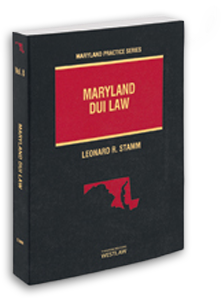(Vol. 8, Maryland Practice Series)
By: Leonard R. Stamm
DUI / DWI / Drunk Driving
Summary of Maryland Drunk Driving – DUI and DWI Laws
The most commonly charged criminal offenses are driving while under the influence of alcohol and driving while impaired by alcohol. Driving while under the influence or DUI can be proven by a test result of .08 or more or by evidence showing that the driver’s normal coordination has been substantially impaired as a result of the consumption of alcohol. The maximum penalties are 1 year and $1000 for a first offense, 2 years and $2000 for a second offense, and 3 years and $3000 for a third offense. DUI also carries 12 points with the MVA and at a hearing the driver’s license may be revoked.
Driving while impaired by alcohol or DWI can be proven by evidence showing that the driver’s normal coordination was impaired to some extent as a result of the consumption of alcohol. This offense can be proved by evidence of a test result of .07 or more, but less than .08. The maximum penalty is 60 days and $500 for a first offense and one year and $500 for a subsequent offense. DWI also carries 8 points with the MVA and at a hearing the driver’s license may be suspended.
If the driver who has been found guilty of either DUI or DWI has not had a prior DUI or DWI in Maryland within the previous 10 years, he or she may be eligible for a probation before judgment or PBJ.
Most DUI cases begin with the police officer stopping the defendant’s car for some observed violation of law. The Fourth Amendment to the United States Constitution requires that a police officer has what is known as articulable reasonable suspicion to believe the defendant has committed, is committing, or is about to commit a crime. Occasionally, the State is unable to prove that the officer had a legitimate reason for stopping the Defendant’s car. In those cases, the Fourth Amendment exclusionary rule requires that the court grant a motion to suppress the evidence that is obtained by the police as a result of the illegal stop. That is usually the balance of the evidence in the case. As a result, when the court grants a motion to suppress in District Court, the State is normally unable to proceed any farther and the court grants a defense motion for a judgment of acquittal.
If the officer had a valid basis for stopping the defendant, the next question is whether the officer had sufficient evidence to require the defendant to exit the car for the purpose of conducting standardized filed sobriety tests. Police officers are trained to perfom a mini-investigation, to decide whether to have the driver exit the car. Frequently, police officers completely skip this step and ask the driver to exit. However, if the basis for the stop did not involve bad driving, and the officer has merely confirmed that the driver has consumed some alcohol, the court could hold the State has failed to establish sufficient articulable reasonable suspicion to have the driver exit the car.
When an officer stops someone who the officer has reason to believe has been drinking, he or she will typically require the driver to exit the car to perform standardized field sobriety tests. The three standardized field sobriety tests approved by the National Highway Safety Administration (NHTSA) are the horizontal gaze nystagmus test, the walk and turn test and the one leg stand test. Based on the driver’s performance, the officer may offer the driver a preliminary breath test at the scene of the stop. Based on all of these tests, as well as any other observations made the officer, the officer may decide to arrest the driver. At the police station the driver is read a form that advises the driver of the license suspension penalties that result from failing the breath test or from refusing a breath test.
In many cases, after the breath test process or refusal is complete the officer has the discretion to release the driver. In other cases, the officer may present the driver to a District Court Commissioner to determine conditions of release.
In court, and at MVA license suspension hearings, a lawyer may be able to challenge what the officer did or failed to do during the investigation. If the defense is successful and the court finds the defendant not guilty, all court and police records may be expunged. In many counties, the typical sentence where there is no accident or injuries, if found guilty, is probation before judgment. Offenders are usually placed on probation long enough to complete an alcohol education or treatment program and attend a MADD victim impact program (a one night meeting where offenders listen to drunk driving victims). Second offenders frequently serve a couple of weekends in jail.
In many cases, there is a viable factual and/or legal defense to the charges. The lawyer’s duty is to zealously pursue the interest of the client within the rules of ethics and the law, to achieve the best possible result for the client. In Maryland, it is important to see a lawyer AS SOON AS POSSIBLE after receiving these charges, to fully protect your rights. Call 301-345-0122 for a FREE consultation with lawyer Leonard R. Stamm.












